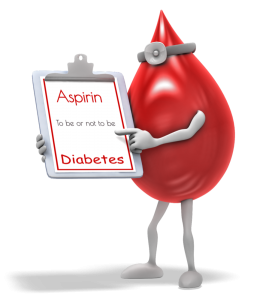15th September, 2018, Dr Chee L Khoo
There is definitely a role for aspirin in preventing cardiovascular (CV) events in patients who already had a CV event (secondary prevention). There is always a risk of gastrointestinal and intracranial bleeding. Because the risk of another event after the first is often significantly higher, when one works out the risk benefit ratio, the benefits of aspirin use usually wins. For a little while, it was thought that the risk profile of patients with diabetes without prior CV events was pretty much like someone who has had a CV event. Hence, for a little while, aspirin was recommended for prevention in all patients with diabetes. Two recent studies put the two sides of the coin into perspective.
The 2009 Anti-thrombotic Triallist Collaboration meta-analysis looked at 95,000 patients in 6 primary prevention trials. They concluded that aspirin use led to a 12% reduction in CV events. However, there was a 50% increase risk of bleeding with aspirin. The benefit or hazard was similar in patients whether they had diabetes or not. Since that meta-analysis, more primary prevention trials with aspirin reported similar findings – the balance of risk and benefits is still uncertain.
ASCEND study reported last month in the New England Journal of Medicine. 15,480 patients with diabetes but no prior CV disease were randomised to either 100mg aspirin daily or placebo and followed up for an average of 7.4 years. Compared with the placebo group, patients on aspirin had a 1.1% reduction in risk of serious vascular events (658 (8.5%) vs 743 (9.6%), p=0.01). However, major bleeding occurred in 314 (4.1%) patients on aspirin compared with 245 (3.2%) patients on placebo, a 0.9% increase in bleeding risk. There was no difference in the incidence of gastrointestinal (GI) cancers and longer term follow up is in place.
Another primary prevention trial with aspirin also reported last month in the Lancet. The ARRIVE trial randomised 12,546 patients aged >55 years (men) and >60 years old (women) to either 100mg aspirin daily or placebo. These patients had moderately high CV risk and did not have diabetes. Patients with high GI bleeding risk were excluded. The median follow up period was 5 years. 269 (4·29%) patients in the aspirin group versus 281 (4·48%) patients in the placebo group had a cardiovascular event.
Gastrointestinal bleeding events (mostly mild) occurred in 61 (0·97%) patients in the aspirin group versus 29 (0·46%) in the placebo group (HR 2·11; 95% CI 1·36–3·28; p=0·0007). The rate for CV events or bleeding events were low. The role of aspirin in primary prevention among patients at moderate risk could therefore not be addressed.
So, what do ASCEND and ARRIVE inform us? With modern multi-modality management, the event rates for patients with moderate to high cardiovascular risk is fortunately very low. Therefore, to prevent an event with aspirin in a patient with low event rate is going to be difficult. Even though the bleeding rate with aspirin is low, the risk benefit just doesn’t really stack up.
Interestingly, there was no difference in the incidence of GI cancers. Perhaps, the time frame was too short to see the difference with aspirin use.
It would be nice to reduce the CV event rate without the increase in bleeding risk. Perhaps, the very patient we would like to prevent a CV event in (high CV risk) is the very patient who also have high bleeding risk.
Reference
Antithrombotic Trialists’ Collaboration. Aspirin in the primary and secondary prevention of vascular disease: collaborative meta-analysis of individual participantdata from randomised trials. Lancet
2009; 373: 1849-60.
ASCEND Study Collaborative Group. Effects of aspirin for primary prevention in persons with diabetes mellitus. N Engl J Med. 2018 Aug 26. doi: 10.1056/NEJMoa1804988. [Epub ahead of print.] https://www.nejm.org/doi/10.1056/NEJMoa1804988
Gaziano JM, Brotons C, Coppolecchia R, et al. Use of aspirin to reduce risk of initial vascular events in patients at moderate risk of cardiovascular disease (ARRIVE): a randomised, double-blind, placebo-controlled trial. Lancet. 2018 Aug 24. doi: 10.1016/S0140-6736(18)31924-X. [Epub ahead of print.] https://www.thelancet.com/journals/lancet/article/PIIS0140-6736(18)31924-X/fulltext
